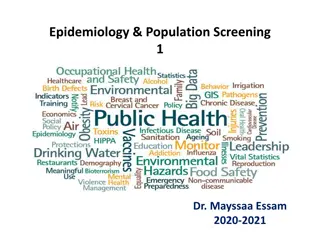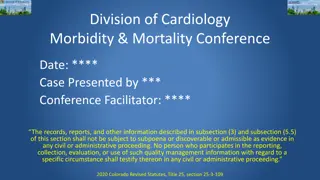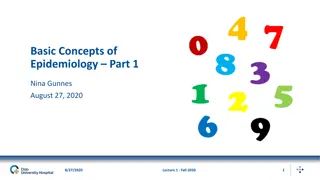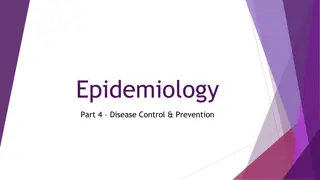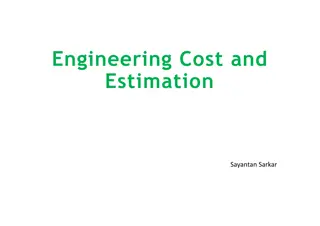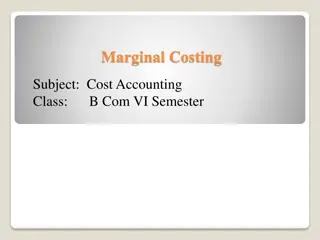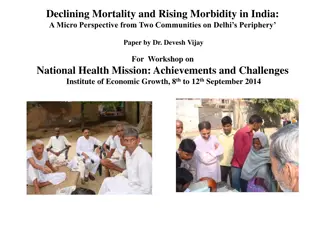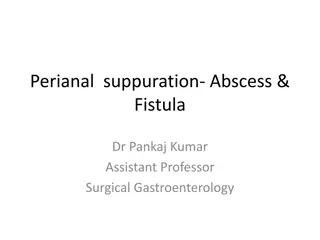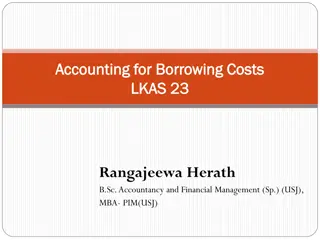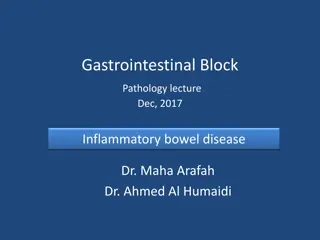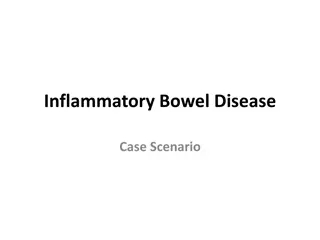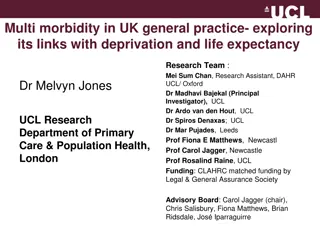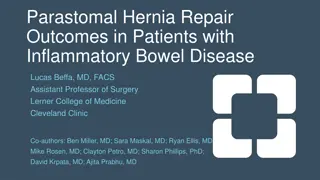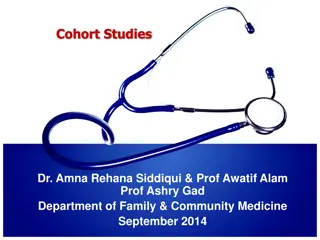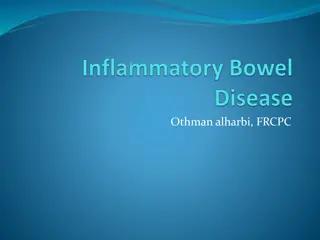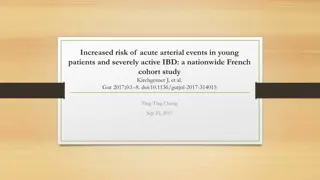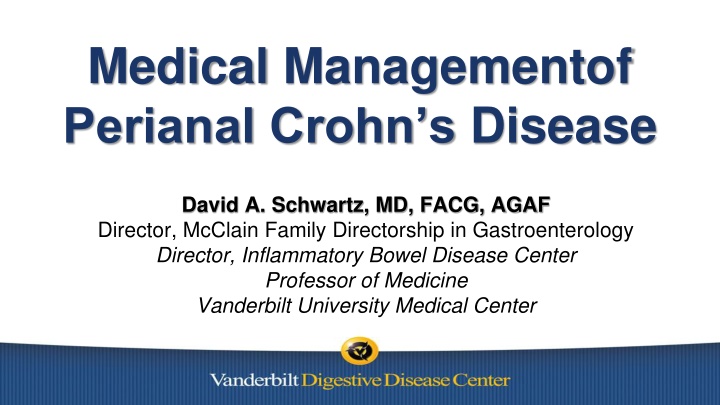
Medical Management of Perianal Crohn's Disease: Epidemiology, Morbidity, and Costs
The epidemiology, morbidity, and associated costs of perianal Crohn’s disease management. Understand the challenges in fistula healing rates and the importance of accurate diagnostics for optimal treatment outcomes.
Download Presentation

Please find below an Image/Link to download the presentation.
The content on the website is provided AS IS for your information and personal use only. It may not be sold, licensed, or shared on other websites without obtaining consent from the author. If you encounter any issues during the download, it is possible that the publisher has removed the file from their server.
You are allowed to download the files provided on this website for personal or commercial use, subject to the condition that they are used lawfully. All files are the property of their respective owners.
The content on the website is provided AS IS for your information and personal use only. It may not be sold, licensed, or shared on other websites without obtaining consent from the author.
E N D
Presentation Transcript
Medical Managementof Perianal Crohn s Disease David A. Schwartz, MD, FACG, AGAF Director, McClain Family Directorship in Gastroenterology Director, Inflammatory Bowel Disease Center Professor of Medicine Vanderbilt University Medical Center
Cumulative Incidence of Crohns Fistulas Rate of PCD decreased in recent cohort > 1998 to 14.5 % Schwartz et al, Gastro 2002 Park et al., IBD 2019
Durable Fistula Healing Rates are Disappointing Retrospective study from Leiden of 232 patients with CD fistulas - ~ 10 years followup 78% had complex fistulas Long term fistula healing was seen in only 37% of patients with complex fistulas 66.7 % of simple fistulas 53 % of patients required surgery (colectomy, etc) Proctectomy Rate in recent Mayo cohort was largely unchanged at 19% Molendijk et al. IBD 2014 Park et al., IBD 2019
PCD is Associated with Increased Costs All-cause Healthcare Costs P < 0.0001 for all comparisons, PAF CD vs non-PAF CD $85,233 GI-related Healthcare Costs P < 0.0001 for all comparisons, PAF CD vs non-PAF CD $90,000 $80,000 $71,612 Inpatient Outpatient 28,635 $70,000 Pharmacy Mean PPPY Cost $60,000 25,204 $50,000 $40,526 $40,000 33,560 $29,458 26,821 17,756 $30,000 14,799 $20,000 18,189 22,441 $10,000 18,505 11,976 2,138 3,964 $0 PAF CD Non-PAF CD PAF CD Non-PAF CD Schwartz et al, 2020
Approach to Initial Diagnosis and Assessment
What Happens When Fistulas are Missed at Time of EUA? -In 52% of patients needed repeat surgery in cases where surgery and MRI disagreed -Fistula recurrence was always at site predicted by MRI Buchanan et al, Lancet 2002
Study Results A prospective triple blinded study compared EUS, MRI and EUA in 32 patients with suspect perianal Crohn s disease.1 All three methods showed excellent accuracy in assessing these patients EUS 91% (95% CI 75% - 98%) EUA 91% (95% CI 75% - 98%) MRI 87% (95% CI 69% - 96%) Combining either of the imaging modalities with EUA increased the accuracy to 100% 1- Schwartz et al., Gastro 2001
Medical Therapies Antibiotics (metronidazole, ciprofloxacin) Immunosuppressives Azathioprine 6-mercaptopurine Cyclosporine Tacrolimus Biologic Agents Infliximab Adalimumab Certolizumab Vedolizumab ? Ustekinumab? Novel Agents Adipose Derive Stem Cells
Antibiotics Improve Fistula healing in Combination with Anti-TNF Therapy N=76 All patients received adalimumab 160 mg at wk 0, 80 mg at wk 2 and then 40 mg qow. Patients were then randomized to Ciprofloxacin 500 mg bid or placebo. 12 Dewint P, et al. Gut 2013.
Azathioprine / 6 - MP The 5 Controlled trials were summarized in a meta- analysis1 22 / 41 (54%) of patients who received AZA /6-MP responded vs. 6 / 29 (21%) who received placebo. Pooled odds ratio was 4.44 in favor of fistula healing 1-Pearson et al. Ann Intern Med. 1995
Cyclosporine & Tacrolimus (FK-506)
Tacrolimus (FK-506) The double blinded placebo study of 48 patients randomized to receive 0.20mg/kg/day for 10 weeks. Primary endpoint was improvement defined as closure of 50% fistulas and maintenance of closure for 4 weeks. Week 10 Results Only 10% had closure of all fistulas Sandborn et al. , Gastro 2003
Infliximab for Crohns Perianal Fistulas Primary endpoint; > 50% reduction in open fistulas Initial Fistula Response to Infliximab N=94 % p = 0.041 p < 0.001 Present et al. , NEJM 1999
Anti-TNF Maintenance Therapy for CD Related Fistulas Adalimumab Infliximab Certolizumab 1-Sands et al. , NEJM 2004 2-Colombel, Gut 2009 3- Schreiber S, et al. APT, 2011 N=28
Anti-TNF Levels and Fistula Healing Clinical Assessment MRI Assessment N=193 (117=IFX) DE Gregorio et al. Clin Gastro and Hep, 2021
The Use of Imaging to Guide Therapy
MRI to Guide Therapy with Infliximab or Adalimumab Medical therapy was increased if no or partial response seen on MRI Ng et al. Am J Gastro 2009
Two Randomized Prospective Studies Looking at EUS to Improve Outcomes Initial Prospective Pilot Study Follow-up Prospective Study 1-Spradlin, Schwartz Am J Gatro 2008 2- Wiese,Schwartz IBD 2015
Post Hoc Analysis Suggests Ustekinumab Effective for Perianal Disease in Crohn s In large retrospective cohort (207 pts)- fistula healing was 39% at 6 months Optimization to trough > 4.5 at week 26 was associated with better healing rates Fistula Resolution at Week 8 - Pooled Data from CERTIFI, UNITI-1 and UNITI-2 Sands, DDW 2017 Battat R. Gastro 2017 Chapuis-Biron et al. Am J gastro 2020
Enterprise- Vedolizumab for CD Perianal Fistulas Schwartz et al. DDW 2020


